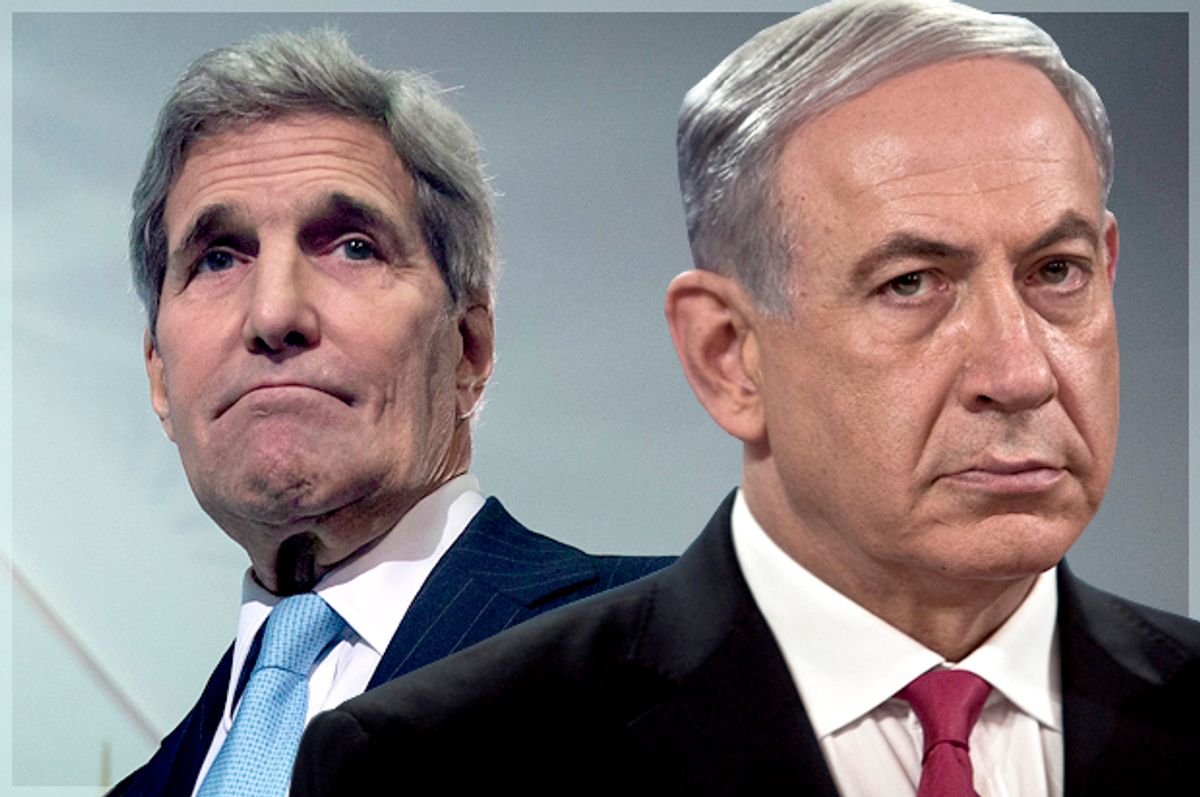John Kerry’s speech on the Israeli-Palestinian conflict on Wednesday was remarkable for many reasons – the unusually sharp tone towards Israel, the almost naked pleading from the stentorian secretary of state for someone, anyone connected to the two warring parties to finally come to their senses and negotiate a solution in good faith.
But most of all it was a remarkable speech for the sense it left that time has finally run out on hewing to the old paradigms through which so much international diplomacy is conducted -- not just in the Middle East but everywhere -- long after facts on the ground have changed enough to make them irrelevant.
In short, it feels as if the Rubicon has been crossed.
There has been a lot of commentary examining how and why the long road of trying to negotiate peace between the Israelis and Palestinians came to this pass. All of it makes sense in some way, but two points stand out to me.
One is the view that the election of a hard-right government in Israel last year and the recent American election that gave the Republican Party unified control of the government are two points on a continuum of rising nationalism that has swamped democracies worldwide. Because Israel’s slide was driven so much by the Palestinian conflict that has swallowed the Middle East for generations, it was easy for the casual observer to miss its connection to the wave that has brought nationalists to power elsewhere, mostly in Europe. (One irony: Israel’s founding in 1948 was driven by Jews who had fled the consequences of the last tide of nationalism to wash away Europe's old order.)
But it is impossible to miss the similarities now. As in Europe and America, the right-wing nationalists who won a surprisingly large victory in Israel’s 2015 election are obsessed with strong borders that keep out Muslims. They are worried about a demographic reality: That at some point soon, there will be more Arabs than Jews living within Israel’s borders.
This knowledge results in some genuine illiberalism, in an effort to keep up the pretense that Israel is both a democracy and a Jewish-majority state. Israel accomplishes this illiberalism largely by denying full personhood and voting rights to Palestinians living in the West Bank. Meanwhile, the country’s hard-right government talks about a one-state solution to the conflict, with Palestinians as permanent non-citizens stuck in a sort of limbo in the West Bank and in Gaza. To give Palestinians full citizenship and voting rights would eventually mean the end of a Jewish majority in Israel, which sort of negates the nation’s reason for existing in the first place.
Israel has been making the one-state solution inevitable with continued construction of settlements that have turned the West Bank into a sort of disconnected archipelago, with the Palestinian population isolated in pockets cut off from each other. The lack of contiguous land has pretty much made the geographic formation of a Palestinian state impossible. But for the purposes of diplomacy, the United States has long pretended otherwise, even as it pushed Israel to freeze construction of new settlements.
Kerry’s speech on Wednesday, along with Prime Minister Bibi Netanyahu’s public attempts to undermine the Obama administration over the years and his alignment with Donald Trump and his nationalism, should have brought home the reality for even the most naïve of us that the two-state solution – Israel existing side-by-side with a demilitarized Palestine – is dead.
Which brings me to the second point. One reason Israel refuses to stop building settlements and colonizing the West Bank is stubbornness born of existential fear. It is the mindset of “Why should we do anything first if the Palestinians don’t want to negotiate with us, or even recognize our right to exist?”
The Palestinians’ attitude is indeed a problem. It’s also irrelevant. Israel is the party with disproportionate power at the moment. That gives it a greater responsibility to take a first step, to get off the path that leads to permanent repression of an entire people, to take a cue from other countries -- like the United States -- that have tried to go down that road and found it both immoral and unsustainable.
In short, Israel should stop building settlements and colonizing the West Bank not only because those things are violations of international law, but because it is the right thing to do. Morally, practically and existentially.
It may not be possible to adequately convey just how difficult it is to admit the two-state solution is dead for those of us who would call ourselves, if we have to have a label, liberal Zionists. By which I mean those of us who believe wholeheartedly in Israel’s right to exist and in the necessity of its existence, if for no other reason than to serve as a permanent middle finger to the generations of czars and Nazis and others – yes, including Arabs – who drove our ancestors out of one land after the other.
At the same time, liberal Zionists held onto the dream of a two-state solution because it is the only way, thanks to demographic reality, that Israel can both retain its Jewish identity and remain a democracy. It was also based on a hope that our Israeli brethren could overcome the justifiable fear of, and anger at, the terrorism of Hamas and Hezbollah. It was based on the belief that -- just as we have watched every day as America struggles to reconcile its belief in democracy with its history of slavery and its dehumanizing treatment of minority populations -- Israel too could do something similar. That it could make similar progress: Slow and halting, perhaps, often taking two steps backward for every step forward, but always working to live up to a democratic ideal.



Shares